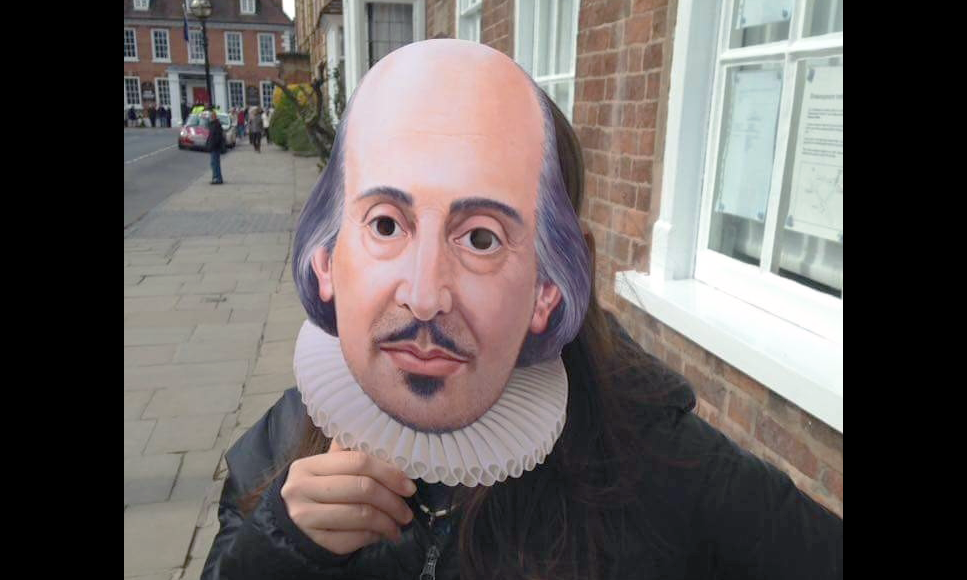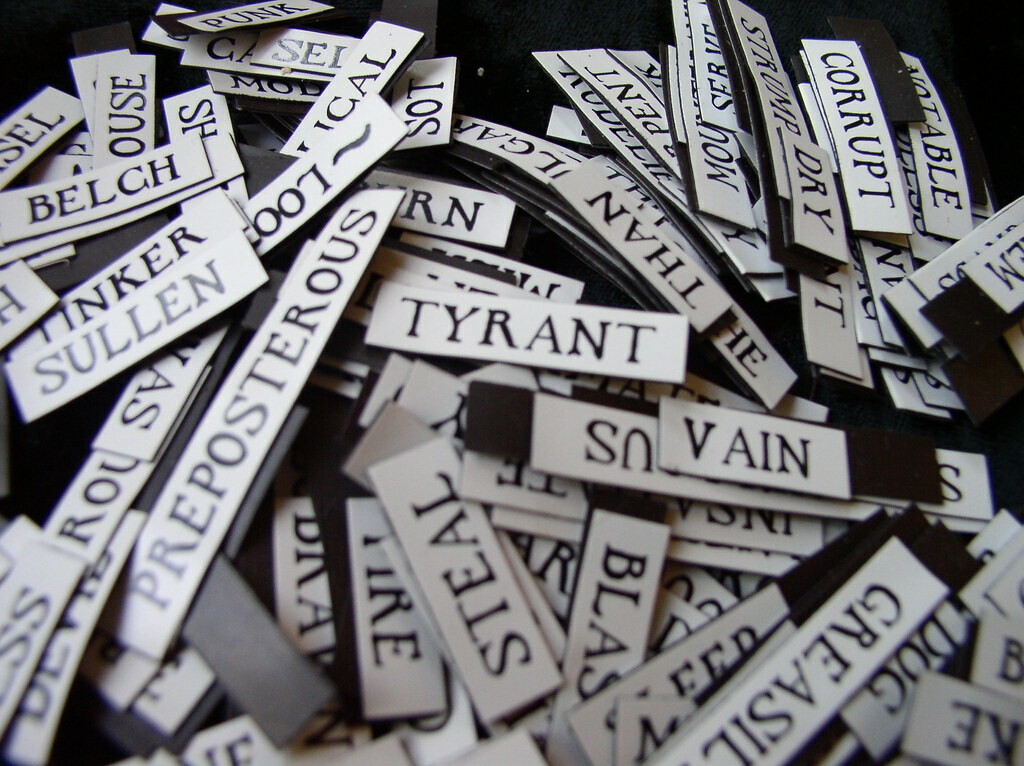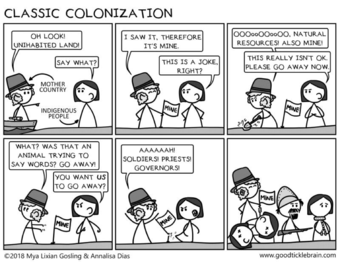I want to talk about Shakespeare. Not Shakespeare the playwright or Shakespeare the poet, but, rather, Shakespeare the system—and what it means for all of us artists, educators, and administrators to be upholding that system. For clarification, the Shakespeare system is not simply Shakespeare’s written work, but the complex and oppressive role his work, legacy, and positionality hold in our contemporary society.
Feeling defensive yet? After all, the education system in the United States has trained all of us to believe Shakespeare is the best. Why else would he be the only playwright required in the American Common Core, our academic standards for education? Why else would he be the most produced playwright in the United States? Why else would he be the way children are introduced to theatre? It is that very placement of Shakespeare as the pinnacle of theatrical achievement that I suggest we interrogate. It is time to examine the factors that have led us to assume there is a “best” and that it is him. Are all of his plays good? What exactly is it that makes him superior?
Promoting Shakespeare as the “best” writer of all time is a dangerous and white supremacist viewpoint. Until the Shakespeare field as a whole learns how to examine that, theatres that produce his work cannot be welcoming spaces for people whose ancestors were beaten and forced to give up their own languages and learn Shakespeare’s. As a Mohegan theatremaker, it is my duty to make clear that the immense amount of space his work currently takes up is an ongoing tool of colonization, just as his work has been used historically as a weapon to remove other people’s cultures and teach them that one British playwright is superior to all other writers. To be clear: I’m not talking about scarcity—there is always room for more plays and more artists. But Shakespeare has not been positioned amongst us. He has been positioned above us, and that is something entirely different.
The immense amount of space [Shakespeare’s] work currently takes up is an ongoing tool of colonization, just as his work has been used historically as a weapon to remove other people’s cultures.
Bardolatry
Is Shakespeare a god? If not, why is “bardolatry” a word? And why is the Shakespeare missionary complex still a real one? Whenever I hear people preach about the universalism of Shakespeare the way missionaries once wielded the Bible, I think to myself, This is dangerous. And yet it goes unquestioned, even though not everyone interprets his work the same way—and not everyone even likes it.
If any other writer were treated as a deity it would not be tolerated, but something about Shakespeare’s role in the colonization of America has made him the exception. That’s right, I did not say his work has made him exceptional, but rather his work’s role in the colonization of America has enabled him to occupy a hierarchical space within a system of oppression.
I have seen the recent anti-racism statements pouring out of Shakespeare institutions both in the United States and internationally—institutions that benefit from and exist to serve and uphold this very system. But in order to begin to do anti-racist work or decolonizing work, the first step for every Shakespeare institution is to ask: What does the worship of Shakespeare do within society? We have to look at the immense space he takes up and the other stories that are silenced because of this.













Comments
The article is just the start of the conversation—we want to know what you think about this subject, too! HowlRound is a space for knowledge-sharing, and we welcome spirited, thoughtful, and on-topic dialogue. Find our full comments policy here
Thank you for this article. I have reread it several times and cited it for my graduate work. You have helped me clarify the dissonance I have felt regarding Shakespeare as a playwright and Shakespeare as an institution. I felt your critique was incisive, clear, and challenging in the best ways. Dillon has already responded better than I could to thoughtless comments, so here is another comment thanking you for calling out a problem and calling in those who are ready to help, but needed a push.
What a great thought provoking essay! This will be one of my research interest. So far I have discovered that Leo Tolstoy vehemently hated Shakespeare. And he published an essay about it when he was a student. If you want to learn more I have posted my essay and Works Cited in the link below.
My essay on the Cultural Phenomenon of Rejecting Shakespeare.
I feel Shakespeare is a good starting point for the kids to whom I teach drama. I also think we have to look at the sexism, racism, and classism in all his works--historical context or not. I did MERCHANT OF VENICE with a group of 10-13 year-olds and we really broke down the racism and anti-Semitism in the play. We then applied it to what "isms" the kids themselves where facing in their own lives, and brought those into the play as well.
Thank you for this piece! Bardolatry has led to all manner of intellectual sins, from the classist "authorship debate" to the First Folio business, to the massive amount of casual (and not so casual) sexism/racism/classism/heterosexism you highlight here. You don't have to look farther than this comment section to see that you've touched a nerve. I look forward to citing this and you.
This is a fascinating and exciting article. I admit to being a Shakespeare lover, but I'm very struck by the author's portrayal of Shakespeare as being rammed down students' throats by fascistic instructors imposing a hegemonic ideology. Rather than "You must love Shakespeare!!", I would bet there are many more schoolteachers whose attitude is "Please, somebody, give Shakespeare a chance!" While it's true that Shakespeare is likely to be included in some way at some point in a standard public school curriculum, there are many many people in the US today--no doubt the overwhelming majority of the population--who didn't like having to read or see his work when they were in school, and in whose life Shakespeare plays no role whatsoever.
Another question I'd have for the author is, if Shakespeare comes down to being above all a voice of colonial oppression and white supremacy, then what do we do with the thousands of analyses and critiques we find in his plays of the hypocrisy, arrogance, foolishness, cruelty, and violence of people in his culture, especially the ones in positions of power?
Thank you Dillon and Armando! And Madeline!
We must interrogate and consider re-shaping the ways we think about systems focusing on any one singular entity as "THE" singular entity, and that means holding space for myriad perspectives, for emotions, for harm reduction, for consideration, for questions.
You make some excellent points, but they are overshadowed by incredible, emotionally-charged assumptions. For example, I have been teaching high school English and/or theatre since 1991, and I have never taught Shakespeare in the manner which you have described here. I've never seen any of my colleagues teach Shakespeare in the manner which you have described here. In fact, by your standards, it seems that no grades can ever be given in relation to literature interpretation or any genre of acting without becoming an oppressor of sorts.
Just to clarify, Shakespeare is not the only playwright required in the American Common Core for grades 6-12. He is the only author required in the American Common Core for grades 6-12. That's huge. However, that means nothing unless you think that students only read one book each year. There is plenty of room in the school year to cover Shakespeare and great women authors and great Black authors and great Hispanic authors and great Native authors and whatever else is inspiring our students in any given year.
Safe space anyone? This is why we lose elections. Study Elizabethan culture—stop trying to tear everything down. There is real racism out there.
Thank you for this article! I am adding it to the required reading for my theatre history course!
To the first commenter: Language and culture (the suppression of indigenous languages and cultures specifically, and the imposition of colonial languages and cultures) were used as tools of colonialism -- this isn't a controversial statement, this is a subject about which historians and literary critics have written for decades (see for example, Benedict Anderson's Imagined Communities and Ngugi wa Thiong'o's Decolonising the Mind).
This essay is ridiculous.
Shakespeare's work only survives because it is an "ongoing tool of colonization"? Perhaps this author should look into how colonized African countries used Shakespeare to fight AGAINST their colonizers. Perhaps they should look into how many non-white prisoners' lives have been completely changed through being exposed to Shakespeare's work.
This essay blindly adheres to the foolish and destructive assumption that many postmodernist thinkers make: that the ubiquity of Shakespeare, or any "great" white male artist, has come about purely by the widespread and well-organized efforts by white supremacists who are hell-bent on removing any other influences that don't represent their group identity. One only has to do about 10 minutes of research before this assumption completely falls apart. I invite all who read this article to embark on this arduous journey themselves.
The point the author makes about teachers wielding their oppressive powers by forcing interpretations down students' throats is absurd. True, a poem or piece of art can be interpreted a supposedly infinite amount of ways, but contrary to what postmodernists think, there are only a select number of interpretations that work in tandem with the artist's intentions and with how one should comport themselves in the real world. And what else is a teacher for, if not to impart their interpretations of their area of expertise to their students? Yes, the students should take the lesson with a grain of salt and decide for themselves. But a teacher has to start somewhere.
Make no mistake, the main reasons Shakespeare survives as a dominant literary influence have nothing to do with oppression. The main reasons for WS's lasting dominance in the literary canon have to do with his unparalleled innovation of language, his ability to explore archetypal characters in an extremely deep (and useful) way, and his ability to portray stories of human nature that audiences of all races and backgrounds instinctively understand in a visceral and often life-altering way.
Did you miss the part where she says "As a Mohegan theatremaker, it is my duty to make clear that the immense amount of space his work currently takes up is an ongoing tool of colonization, just as his work has been used historically as a weapon to remove other people’s cultures and teach them that one British playwright is superior to all other writers."
Or the other part: "This experience is not uncommon for Native theatre artists like myself, because what is funded, what is produced, and what is taught in this country is predominantly Shakespeare. As a teen, I could not go online or to the bookstore and acquire a copy of a Native play, but Shakespeare was easily available everywhere. This is no accident."
Or another: "I’m not saying Shakespeare’s plays don’t have merits, but they are finite and do not represent all of us. No one should be forced to see themselves through his work."
Or: "I’m not saying that if you love Shakespeare you shouldn’t, or for people to stop producing his work, but I am saying the Shakespeare system—where everything is compared to one white man’s legacy—is inherently destructive."
Or even click on any of the sources she links to? Did you actively read and engage in this before you decided to lump a Native theatremaker in with white postmodernists? Did you do your own 10 minutes of research before making your own assumptions?
You say "Make no mistake, the main reasons Shakespeare survives as a dominant literary influence have nothing to do with oppression." Literature is the first step of indoctrination in schools. It's a technique as old as western theatre, from the Romans, to Christians, to global colonization, to fascism. Read again where Madeline talks about the system of Bardolatry itself and not Shakespeare's work. That is the crux of the argument and that is what you are so incorrectly calling "ridiculous."
Thank you, Dillon. Can we also name that the works of countless many were burned to make room for this indoctrination via literature? That capitalism enables bardolatry because we need not pay Shakespeare to publish, produce, or adapt his work? That humans made and make decisions to delibrately defend and enact a status quo that is built to serve white supremacy?
Colonization may not be the only reason WS' works have survived, but it is certainly the reason that it is so exalted and ubiquitous. It is also the reason that the work of so many others didn't survive to receive the same or greater praise.